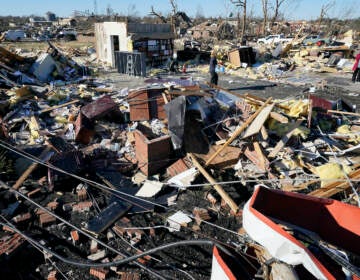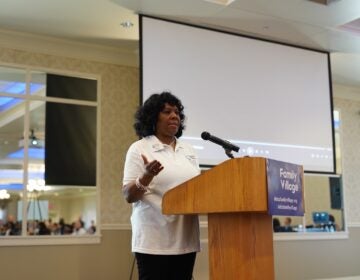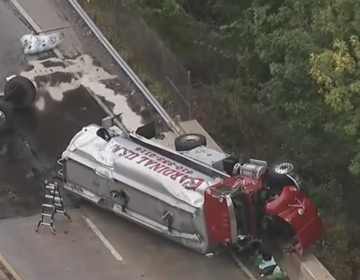How Delco Dawgs and others work to unsnarl the county’s stray animal issue
Delco has no countywide animal shelter, or even a comprehensive animal control structure, leaving cats and dogs out on the street.
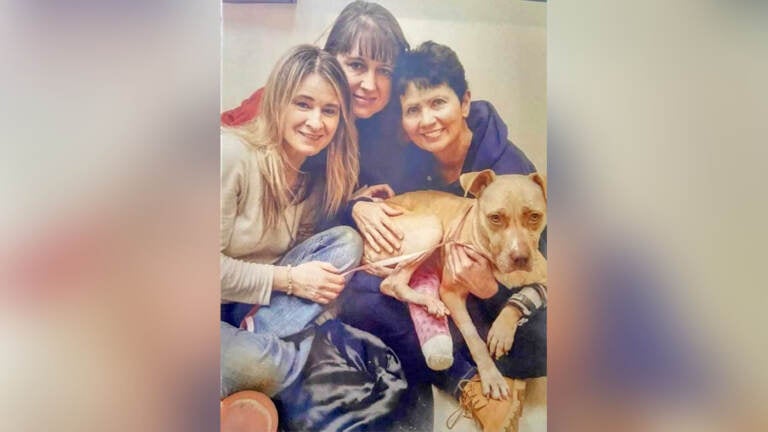
(Left to right) Jill Speckman, Lorie Stambaugh, and Mary LaRosa pose with Rosey. (Delco Dawgs)
We wrote this story based on contributions from readers and listeners like you. In Montgomery and Delaware counties, what do you wonder about the places, the people, and the culture that you want WHYY to investigate? Let us know here.
Delaware County stood apart from other counties for years because it lacked a health department. But it is also without a countywide animal shelter, or even a comprehensive animal control structure to deal with strays — leaving cats and dogs out on the street in some municipalities.
That doesn’t mean people aren’t working to change the situation, however. Jill Speckman, founder and president of Delco Dawgs, said she is so passionate about filling the void that she can talk about the issue for “100 hours straight.”
Delco Dawgs is a nonprofit animal rescue whose focus is taking on the tough cases, like injured or sick animals and those who are lost or abandoned. The rescue pulls resources together to ensure that the animals in its care receive medical attention from local veterinarians.
Its team is made up of less than a dozen volunteers, not including foster homes, and 100% of donations go toward animal care. There is no central location. Despite the small staff and limited resources, Delco Dawgs even acts as a search-and-rescue unit for missing pets, setting up elaborate food traps and cameras.
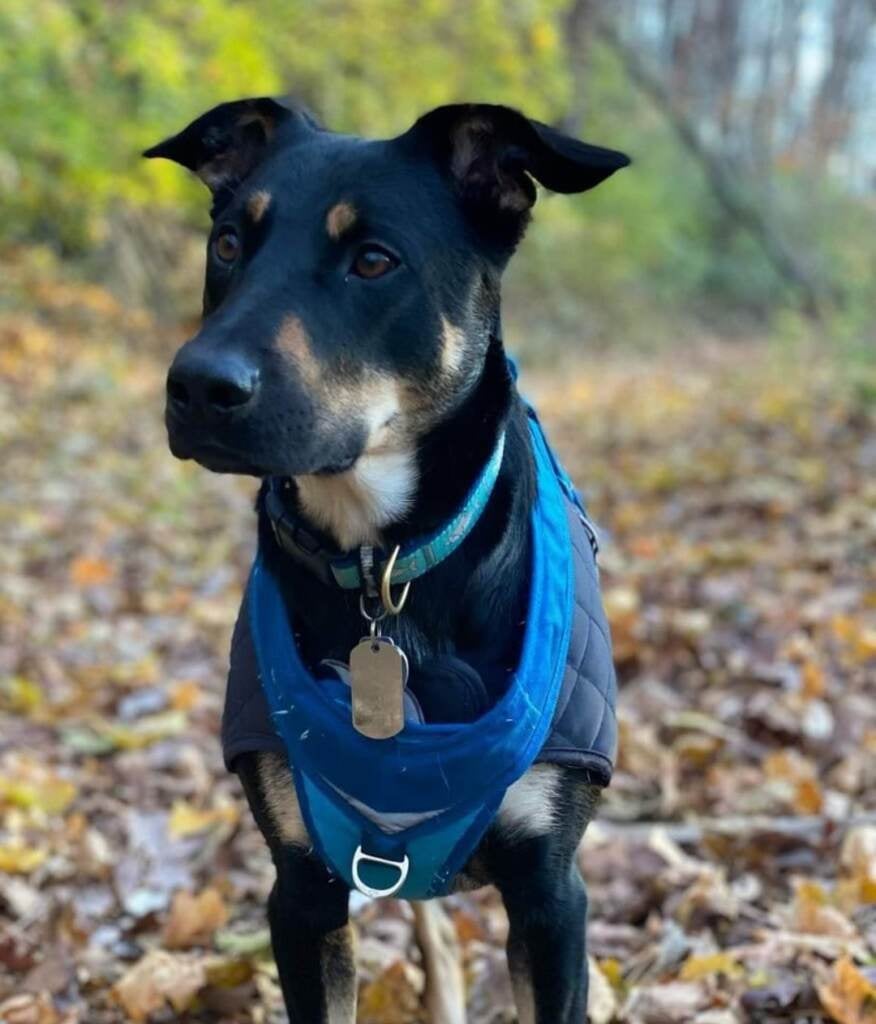
“That’s basically what we do. And I think that that’s my purpose for being here. And I don’t know if I would have a purpose otherwise, if I wasn’t doing this. It’s why I get up,” Speckman said.
Back in 2016, Speckman was on medical leave at her job when she heard the news of a missing Shetland sheepdog in the area. She joined the search, decided she wanted to do more for animals, and Delco Dawgs was born.
Eventually, Speckman left her salaried job of nearly 25 years in radio and pulled together a team of community members to start an animal rescue. She said Delco Dawgs was lucky to have a large network of connections and a loyal donor base to fall back on, especially considering its focus on dogs in need.
“We try to take the ones that we know we’re gonna have a little bit longer and a harder time adopting out … We try to take the ones we know people aren’t going to want to put thousands of dollars in to fix. So we’ll take those instead of the healthier ones,” Speckman said.

With some animals needing treatment and/or rehab for months, Delco Dawgs is patient in its approach. It takes pets surrendered by owners. The group even works with ACCT Philly (Animal Care and Control Team of Philadelphia), which sometimes has had to euthanize for space, to do intake with some animals.
Delco Dawgs has found a niche as a small-scale rescue that takes on big tasks.
“We usually have anywhere from 18 to 25 in foster at one time. Sometimes, it goes down a little bit faster, because like all of a sudden we’ll have four of them get adopted right away, but then we’ll bring in three more,” said Lorie Stambaugh, foster and adoption coordinator for Delco Dawgs.
But there is one thing it doesn’t have much control over: strays.
“We try to help out. We’re not allowed, according to dog law, to pick up a stray dog off the street and bring it into our rescue — but we can help to find ways to get them legally through the system through places that are allowed to take them,” Speckman said.
It wasn’t always that way with strays
The Providence Animal Center in Media has found a new niche as well. It tends to accept animals from overcrowded shelters at risk of being euthanized. Formerly known as the Delaware County SPCA, it has been in operation since 1911 and has had a physical location in the county seat since the 1930s.
The center currently has 70 employees and is supported with volunteer staff, accepting animals from as far away as Alaska.
But though the location has stayed the same, its mission used to be a bit broader. Previously, the Delaware County SPCA had “stray animal contracts” with Delco municipalities to accept stray animals, but that became “very burdensome.”
“We were unfortunately euthanizing more animals than we were adopting out. And it has always been a dream of the organization to become a lifesaving facility, which people commonly refer to as a no-kill facility. So we were able to make that change back in 2012,” said Justina Calgiano, director of advancement and public relations at Providence Animal Center.
Since then, the shelter has been operating at a 97% save rate, meaning that only incurably ill or behaviorally aggressive animals are put down.
“We did change our name, to better reflect the work that we’re doing in this area, and to show people that we, again, are not affiliated with the county in any specific way regarding stray animals,” Calgiano said.
Yet the stray animal issue has only highlighted Delaware County’s unusual ability to find itself without what would seem to be 21st-century functions.
“Delaware County is very unique in that there is not a county shelter that is run by county officials. So this has created a lot of aggravation for the citizens of Delaware County. They reach out to us very upset about what to do with the dog that they found. Of course, we share those feelings because we want those dogs to go to a place where hopefully their owners can reclaim them,” Calgiano said.
The system creates a situation in which once animals are lost, they are much harder to reunite with families.

“Facebook has really been a godsend for the citizens who have lost animals, because animals have been posted. And it’s now going viral in terms of, ‘Oh, this dog was lost.” The lost-and-found pages have reunited quite a lot of animals. So that has essentially been working as a shelter — as a viral shelter in terms of how and where people look for pets that have gone missing,” Calgiano said.
Some municipalities have no stray animal contracts. In the cases where they do, Providence Animal Center tries its best to connect the public to the correct service in the confusing system.
Others partner with local vets for stray animal intake, and some partner with the Brandywine Valley SPCA in Chester County. The shelter there provides services for Chester and Delaware counties as well as the entire state of Delaware.
“We provide full-service open admission sheltering for stray intakes in our contracted municipalities. And then we also do owner surrenders. And then we have a full-fledged medical clinic that provides spay, neuter, and intake diversion and wellness services to the community,” said Adam Lamb, CEO of Brandywine Valley SPCA.
He said Delaware County’s unusual situation has existed for some time, with an overall lack of comprehensive services.
Brandywine Valley currently has contracts with just 14 of Delco’s 49 municipalities: Brookhaven, Chester Township, Collingdale, Concord, Folcroft, Marcus Hook, Middletown, Parkside, Sharon Hill, Springfield, Tinicum, Trainer, Upland, and Upper Chichester.
The shelter used to have a contract with the entire county.
“But we very early on learned that most of the municipalities were not having animals come to our shelter, and they were finding ways to circumvent the system. And then they would not have to pay the county. So the county was basically on the hook for that mandatory minimum amount of animals that were coming in. So we did terminate that agreement, because we felt like it was a disservice to the people in Delaware County, because ultimately the animals weren’t truly coming to us and the constituents were calling us asking where their animals were,” Lamb said.
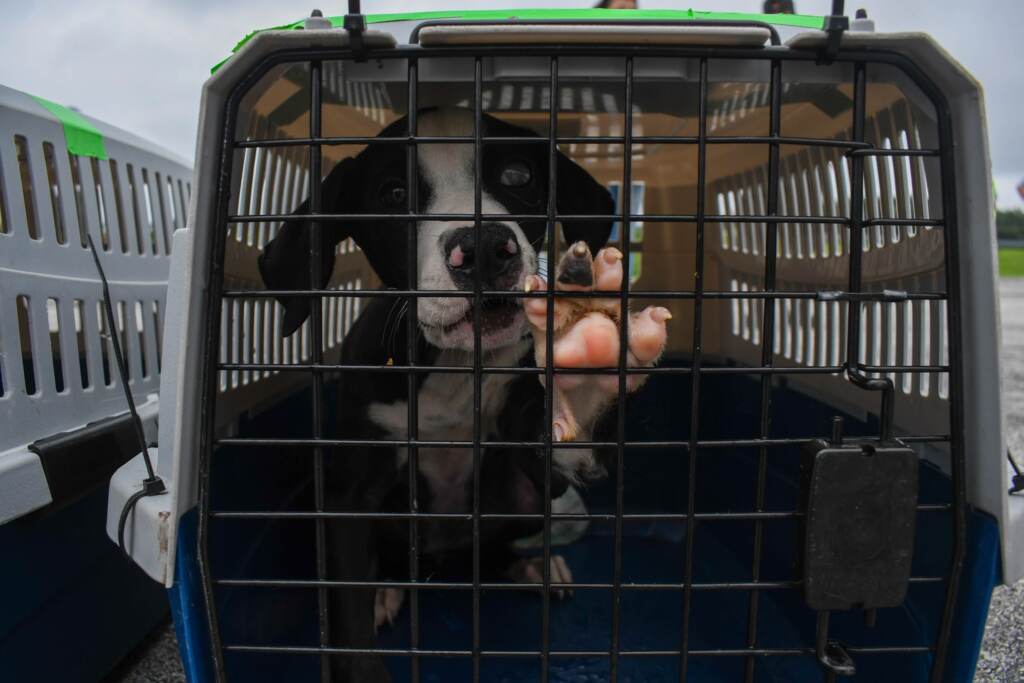
Because Brandywine wouldn’t provide the actual work in the field and the townships would, some of the municipalities would ask the finders to keep the animals and then they would put them on a Facebook page to try and reunite them with the owners themselves, skirting the system.
“We just found that there was ethically a lot of things that were kind of not being done in the best interest of the animals and the people of Delaware County. And so we had long, long conversations with the county at that time, and they ultimately agreed that it was in the best interest to not have the agreement in place with us,” Lamb said.
Despite their different roles, all the shelters think that something needs to change in Delaware County to solve the stray problem.
Delco Dawgs came in with big dreams, but it soon learned it is simply too small to take on a task of this size.
“There’s that many stray animals, and there’s that many running around, and post-COVID animals and everything. There’s so many that I don’t think people really understand the need for it and how big this is and how much it would entail,” Speckman said.
She said a shelter bigger than Delco Dawgs would be the only one capable of untangling the mess.
What the county says
Delaware County Council member Kevin Madden is well aware of the issues and the “mixed-bag” approach that municipalities use at the moment. He said the county made an effort a few years ago to try and attract a third party to step in and help. The county offered to find or build a facility for an entity to run local animal intake and control.
“Unfortunately, we kind of struck out,” Madden said. “We had one organization that was interested, but we could never really make it work to their satisfaction. But it’s not something that’s fallen off the radar completely. We’ve had a lot on our plate the last two years with this pandemic and all the transitions that we’re making with the new leadership in Delaware County Council, but it is something that I still hold out hope we can do something on.”
Lamb, of the Brandywine Valley SPCA, has heard the county’s pitch, but he said that animal shelters are not for-profit businesses. Many operations consistently lose money. Lamb said that in the past the shelter committed a large sum to fixing the issue and the building itself, but he added that most of the financial responsibility should fall on municipalities.
“We don’t believe that what was being offered or what was being talked about is a financially stable solution, unfortunately, and we believe that they’re looking for individual nonprofits or small groups to fill this void instead of accepting the responsibility that this is something that you should be providing to your constituents,” Lamb said.
In an ideal situation, Lamb said, there must be a municipal fee structure in place so that the shelter can sustain itself in the long term. Brandywine Valley is still open to having conversations with the county.
In the meantime, Delco Dawgs’ Speckman said people should know that they can avoid letting their pet become a stray by contacting a shelter first, rather than throwing the animal out into the street.

Saturdays just got more interesting.
WHYY is your source for fact-based, in-depth journalism and information. As a nonprofit organization, we rely on financial support from readers like you. Please give today.



